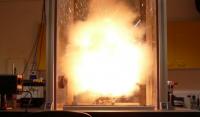Oct 9 2008
Scientists at the UK's National Physical Laboratory (NPL) in Teddington have designed a high-speed thermometer that can measure the temperature inside explosions without being damaged in the impact.
 The detonation of a small pyrotechnic charge in the NPL facility. A radiation pyrometer on the left side of the image observes the event.
The detonation of a small pyrotechnic charge in the NPL facility. A radiation pyrometer on the left side of the image observes the event.
The shockwave, heat, soot and debris from an explosion can damage thermometers. Conventional thermocouples do not react quickly enough to capture the information. This makes modeling the interaction of an explosion with its environment problematic – as temperature is essential in any calculations.
NPL scientists have now designed a reusable bomb-proof thermometer to understand the physical and chemical processes that occur during the detonation and expansion phases of an explosion. It is an optical fibre 400 microns (0.4 mm) across, protected from the blast by a sand-packed steel tube with one open end.
The thermometer detects thermal radiation at four different wavelengths, collecting more information about the thermal physics of the explosion than could be obtained from any one wavelength alone. The optical fibre probe collects thermal radiation, which is transmitted over a suitable safe distance to the main instrumentation.
To measure the temperature of the fireball, the thermometer was first calibrated up to 3000 K (2727 °C). This made it possible to convert the measured thermal radiation signals into temperatures. The thermometer can take 50,000 measurements per second, producing a detailed profile of temperature changes during a split-second detonation.
After a successful simple field trial NPL now hopes to examine much larger explosions. The findings will help to fine tune predictive models on many different explosion parameters.
NPL lead scientist, Gavin Sutton said:
"We produced a working prototype thermometer after some successful field trials and hope to measure the temperature